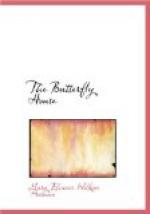Chapter I
Fairbridge, the little New Jersey village, or rather city (for it had won municipal government some years before, in spite of the protest of far-seeing citizens who descried in the distance bonded debts out of proportion to the tiny shoulders of the place), was a misnomer. Often a person, being in Fairbridge for the first time, and being driven by way of entertainment about the rural streets, would inquire, “Why Fairbridge?”
Bridges there were none, except those over which the trains thundered to and from New York, and the adjective, except to old inhabitants who had a curious fierce loyalty for the place, did not seemingly apply. Fairbridge could hardly, by an unbiassed person who did not dwell in the little village and view its features through the rosy glamour of home life, be called “fair.” There were a few pretty streets, with well-kept sidewalks, and ambitious, although small houses, and there were many lovely bits of views to be obtained, especially in the green flush of spring, and the red glow of autumn over the softly swelling New Jersey landscape with its warm red soil to the distant rise of low blue hills; but it was not fair enough in a general way to justify its name. Yet Fairbridge it was, without bridge, or natural beauty, and no mortal knew why. The origin of the name was lost in the petty mist of a petty past.
Fairbridge was tragically petty, inasmuch as it saw itself great. In Fairbridge narrowness reigned, nay, tyrannised, and was not recognised as such. There was something fairly uncanny about Fairbridge’s influence upon people after they had lived there even a few years. The influence held good, too, in the cases of men who daily went to business or professions in New York. Even Wall Street was no sinecure. Back they would come at night, and the terrible, narrow maelstrom of pettiness sucked them in. All outside interest was as naught. International affairs seemed insignificant when once one was really in Fairbridge.
Fairbridge, although rampant when local politics were concerned, had no regard whatever for those of the nation at large, except as they involved Fairbridge. Fairbridge, to its own understanding, was a nucleus, an ultimatum. It was an example of the triumph of the infinitesimal. It saw itself through a microscope and loomed up gigantic. Fairbridge was like an insect, born with the conviction that it was an elephant. There was at once something ludicrous, and magnificent, and terrible about it. It had the impressiveness of the abnormal and prehistoric. In one sense, it was prehistoric. It was as a giant survivor of a degenerate species.
Withal, it was puzzling. People if pinned down could not say why, in Fairbridge, the little was so monstrous, whether it depended upon local conditions, upon the general population, or upon a few who had an undue estimation of themselves and all connected with them. Was Fairbridge great because of its inhabitants, or were the inhabitants great because of Fairbridge? Who could say? And why was Fairbridge so important that its very smallness overwhelmed that which, by the nature of things, seemed overwhelming? Nobody knew, or rather, so tremendous was the power of the small in the village, that nobody inquired.




